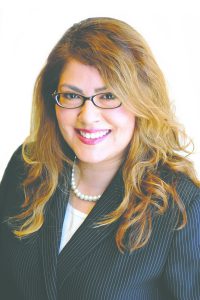Carmen Chávez is from San Diego, but she feels like she has experienced the world from her local office. For the last nine years, she has worked as the Executive Director of Casa Cornelia, a law center that provides pro-bono legal services to victims of human and civil rights violations. Carmen has helped people from around the globe, from Iraq to Uganda and from Vietnam to Latin America. The people she helps all have one thing in common: They are hoping to find asylum in the United States.
“Some are victims of torture, trafficking, abuse or persecution in their home country,” says Chavez. “They come to the U.S seeking asylum.”
The asylum process is not simple, but that is why Casa Cornelia steps in. A team of lawyers, experts, and volunteers, all led by Chavez helps refugees navigate through the country’s legal process.
“Immigration law is very complex and lengthy,” says Chavez. “It’s difficult to be successful on your own. These people really need an experienced attorney to help them navigate the difficulties in immigration law.”
Roughly 2,000 people were helped by Casa Cornelia in 2015. Services ranged from passing on information, all the way to counseling and even going to trial. For Chavez, these cases are much more than just statistics; they are actual people she’s come to know. She has seen them cry tears of pain and release sighs of relief. She has heard refugees’ gut-wrenching stories of abuse and the strength it took to overcome their hardships. Ultimately, she has seen these immigrants start a new life. There are countless cases, but some are engrained in her heart.
“Their gratitude is overwhelming,” says Chavez. “I remember a man who told me: ‘I have two birthdays: The day my mother gave birth to me, and today, because today my new life begins.’”
It’s not surprising that Chavez chose this line of work. Growing up, her mother was a community organizer who dealt with youths who were involved in gangs; so from a young age, she was exposed to the real life struggles immigrant families go through. But it was actually a Latino Leadership Conference that marked her life. She met a female judge at the conference. Even though Chavez was only 16 years old at the time, she sensed the judge’s dignity and her commitment to help those in need. That is when Chavez decided community engagement was for her.
After studying political science at San Diego State University, she went on to study at Loyola Law School in Los Angeles. She remembers her mother telling her, ‘to those who much is given, much is expected.’ The phrase resonated with her back then, and it still does now.
“I’m advocating for people who really need protection,” explains Chavez. “Every day, I’m carrying out my personal convictions by helping those who have no voice. They can’t afford to hire an attorney, so we try to assist them as best we can.”
Over the years, some of the people Casa Cornelia has assisted have gone on to start their own businesses. Once their immigration case is settled, some have stayed in touch with Chavez. Chavez says, seeing them become successful is all the gratitude she needs.
“We helped a woman with her immigration case,” recalls Chavez. “I will never forget how excited she was to receive an identification card. Up to that point, she really didn’t have an identity. She kept on asking me, ‘Does this mean I can take driving lessons?’ and ‘does this mean I can go to school?’ I told her, with this ID many doors will open for you. She was almost in tears.”
Casa Cornelia may be in San Diego, but the organization deals with much more than just English and Spanish speakers. The law firm engages in work in over 50 languages. From Arabic to Farsi and from Mandarin to a Mayan dialect. To carry out some of this work, the organization depends on volunteers and donors to keep programs afloat.
Just a couple of years ago, television stations were airing non stop coverage of unaccompanied minors from Central America. The kids were making their way to the U.S. border, hoping to seek asylum. The issue made international news, but eventually the coverage subsided. Chavez says, the issue is still a reality and it’s still happening along the border.
“Those are the kids we help,” explains Chavez. “They are Central American children who are fleeing from violence. They’re still making their way here. The issue has not disappeared. It has been going on for years.”
In fact, the children’s program offered by Casa Cornelia is the center’s largest program. In 2014 legal services were given to 633 children, completely free of charge.
The refugee crisis in the Middle East has also triggered a new dynamic for Casa Cornelia. After Detroit, the city of El Cajon has the largest number of Iraqi refugees in the country.
“The United States is very slow in accepting refugees,” says Chavez. “When people ask me: ‘But why should we welcome them?’ I remind them it’s the fabric of our country. It’s who we are. We are a nation of immigrants.”
As Chavez heads a staff of 24 people, she says her job at Casa Cornelia is about much more than just clocking in and out of the office. Her work is a mission. A mission, Chavez says, she’s honored to take part in, day in and day out. It’s a mission she takes great pride in. Ultimately she has the opportunity to change people’s lives.
